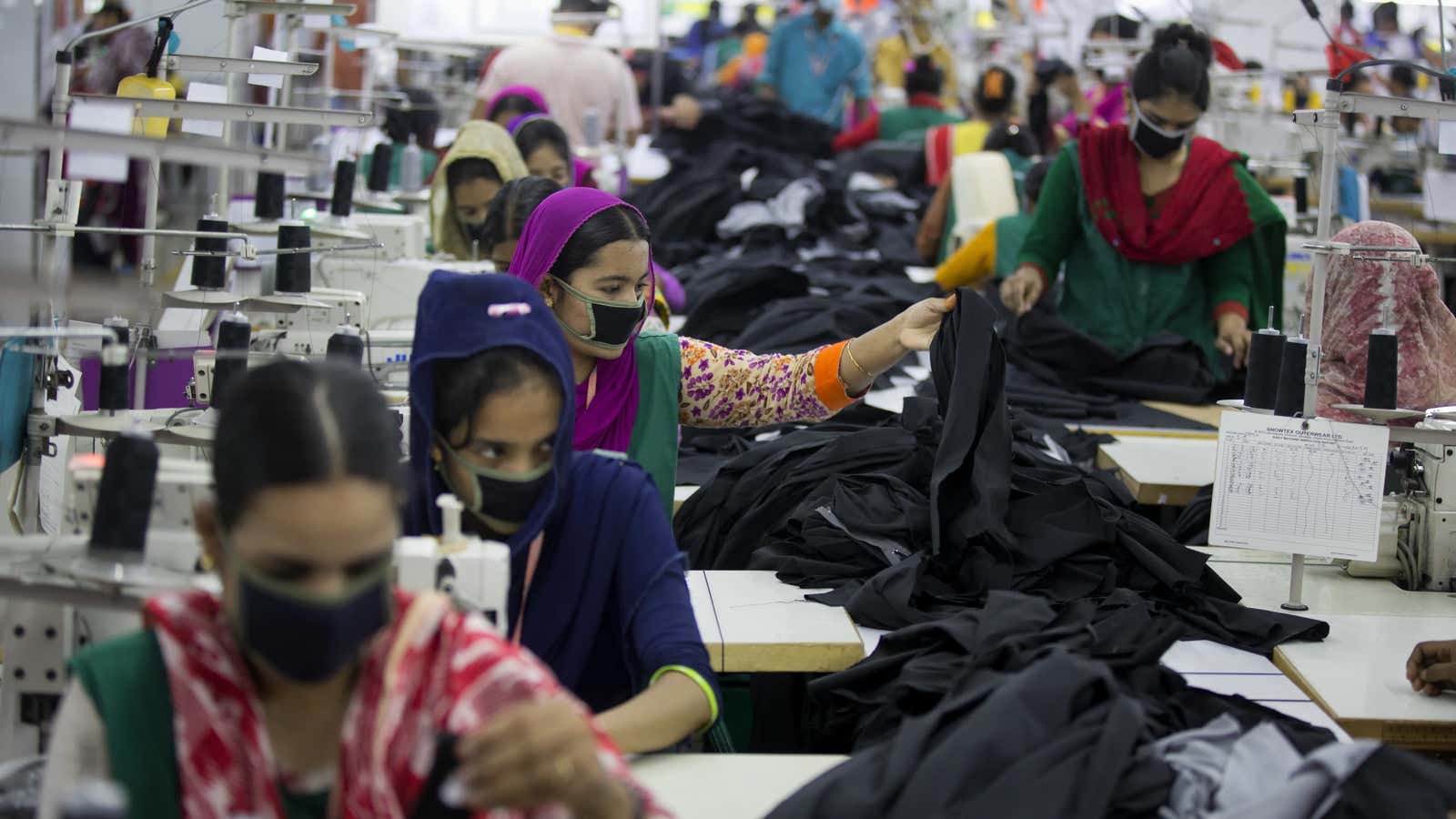Across much of Asia, Europe, and the US, Covid-19 has brought shopping for anything but necessities practically to a standstill. Among the industries most at risk is clothing. Fashion retailers have shut stores as part of social-distancing measures and watched sales plunge as home-bound shoppers pause spending on non-essential items.
The impact is rippling through fashion’s supply chain, putting at risk the livelihoods of garment workers, who are already some of the most vulnerable workers in the global economy.
To keep costs down, mass-market fashion companies do much of their manufacturing in low-wage countries across Southeast Asia, on the peripheries of Europe, and in locations such as Ethiopia. The pay can be barely enough for workers and their families to survive on, providing just the thinnest of protections from poverty.
Many garment factories were already under pressure due to a lack of raw materials, much of which come from coronavirus-hit China. But now companies are halting new orders (paywall) and asking factories not to ship clothes they’ve already made. H&M, for instance, has had to “temporarily pause new orders as well as evaluate potential changes on recently placed orders” due to the global drop in demand, a spokesperson said in an emailed statement.
In Bangladesh, factories have already seen $138 million in orders canceled or postponed due to the coronavirus, Reuters reported. In a typical month last year, the country’s garment exports ranged from about $2.7 billion to $3.1 billion, according to the Bangladesh Garment Manufacturers and Exporters Association (BGMEA). Rubana Huq, president of the BGMEA, told Vogue Business that 20 factories collectively had $10 million in orders canceled in one day this week. “Most brands are putting the orders indefinitely on hold and cancelling,” she said. “For them it’s a question of the survival of the businesses, for us it’s the survival of our 4.1 million workers.”
Myanmar has seen at least 20 factories close, mostly from the shortage of raw materials, leaving more than 10,000 workers potentially jobless. Thousands of workers in Cambodia have been left unemployed. As the crisis continues factories in other countries seem certain to suffer as well.
Many fashion companies have committed to paying employees while their stores remain closed, but factory workers don’t often have the same safety net. Fashion companies don’t typically own the factories making their clothes, and the factory owners, who are already operating on narrow margins, may be unable or unwilling to pay workers as they await new orders.
Cambodia has announced a plan for garment workers to receive 60% of the minimum wage if their factories closed, with 40% coming from the factory owners and 20% provided by the government. Myanmar’s government will give loans to factory owners if they can’t pay salaries, and Turkey has announced a stimulus package to shore up several sectors, including its garment industry. Quartz has reached out to the BGMEA for information about any assistance Bangladesh’s government will offer garment workers and will update this story with any reply.
Industry watchdogs are calling on companies to help. “Brands must take responsibility for workers throughout their supply chains and ensure that the garment workers who have made their profits possible do not carry the industry’s financial burden during this pandemic,” Clean Clothes Campaign said in a March 17 statement. Scott Nova, executive director at Worker Rights Consortium, told the Guardian if companies choose a business model that depends on overseas factory workers, then “these people are their workers as well.”
H&M’s spokesperson said the company’s “long-term commitment to suppliers will remain intact and we are in close and transparent dialogue with them, but in this extreme situation we need to respond fast, together with our business partners, and take decisions that can be difficult in the short-term, but necessary in the long-term.” The company is also working with the International Labour Organization, trade unions, and other industry stakeholders to find solutions, the spokesperson said.
Gap Inc. declined to comment. Inditex (owner of Zara), Uniqlo, and PVH Corp. (owner of Tommy Hilfiger and Calvin Klein) had not replied to requests for comment by the time this story published. The story will be updated with any replies.




